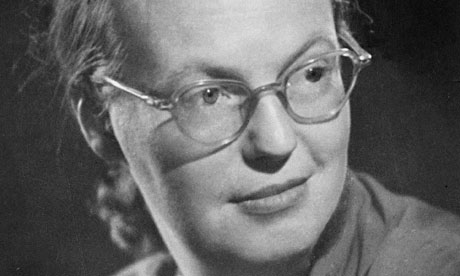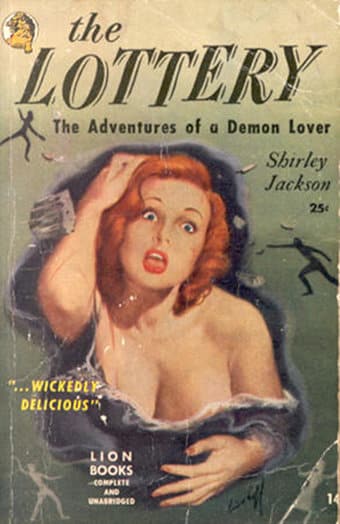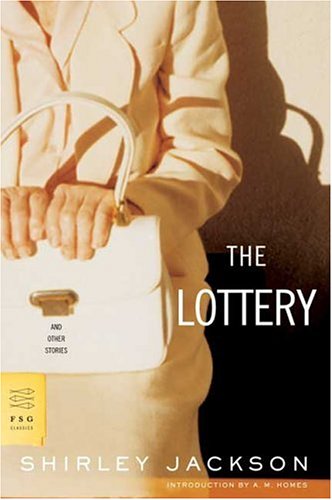 |
| Shirley Jackson |
"The Lottery" is no exception. Most people today think of lotteries as happy occasions when some lucky person has won a lot of money. The dictionary.com definition of "lottery" is a gambling game or method of raising money, in which large members of tickets are sold and a drawing is held for certain prizes, any scheme for the distribution of prizes by chance, or any happening or process that is or appears to be determined by chance. Prizes are usually involved. That sounds nice and fun, doesn't it? But there is an ancient tradition of casting lots or drawing straws to decide something or who will do something unpleasant. You might like to read this Wikipedia article on Sortition, the process of and reasons for casting lots. The article goes into the advantages and disadvantages. This process is often seen as the most fair without discrimination among participants, but Mrs. Hutchinson brings up fairness several times.
What struck me about this story in reading it again was the lack of any obvious horror element until the very end, when she sprung it on me full-force. It was a quick blast and left me shocked and stunned. Up until the very end, I had no inkling of what was to come. I didn't remember, from my earlier reading of the story, how absolutely ordinary the people were or how casual they acted about the event of the lottery. These are good neighbors, friendly and considerate of each other, people I'd like to know. The lottery is lumped together with the other "square dances, the teen-age club, the Halloween party" run by civic leader, Mr. Summers. I could be attending any ordinary village celebration or meeting.
Are there hints of what is to come? Well, the children gathering rocks in a pile might give us a clue; however, I know a lot of kids who like to collect rocks, so I'm not surprised by their gatherings. Despite the neighborhood block party atmosphere, I don't feel like there is a lot of mingling, and the conversations among villagers seem quite subdued. They just seem to be waiting for the meeting to start. When Mr. Summers asks for assistance in stabilizing the big black box, there is "hesitation" before somebody comes forward to help. Is there a reluctance to touch the box? Mrs. Hutchinson is definitely unhappy that she is late, but I get unhappy, too, if I am late for an important meeting. And clearly, Mrs. Hutchinson is upset about her family being drawn in the lottery and is questioning the fairness of the process. What is the prize for this lottery anyway? It must be something that people don't really want, but if that is the case, why weren't they acting more upset and nervous in the beginning?
What we are lacking in this story is the WHY of it all. Obviously the black box is quite old and the ritual of the lottery has been happening for some time. But why? What is the history and the purpose of the event? Do the people in the story even know why they are doing it? Is the tradition lost in time and they just continue it as a part of their culture? I was a little disturbed at the beginning (only because I had read the story before and remembered the ending) that these lotteries seem to be a common occurrence, not just in this community but in others, as well. Shirley doesn't explain and I have wondered about the back story, but maybe I am kept in the dark on purpose to make me connect more with the villagers, who might also be in the dark about the history of the event. It's just something that takes place once a year that everybody is supposed to participate in. But the event is brutal and savage and totally unexplained and unexplainable. Of course, those features make it more horrible, along with the fact that these people, who are so civil and jovial towards each other one moment, can suddenly commit this act towards one of their own. I would like to know more about the why of it all. Wouldn't you? Or would that only spoil the horror of the story if we knew more?


Here are some past book covers which I found interesting. Sometimes I really wonder about the designers of book covers. Do they ever READ the story first before they do the cover. I often think not. The first cover on the left shows us an inkling of the story, with the stones, but I'm not sure what to make of the young woman. Is she dancing? She also could be described as being in a cruxifix form, making me think of sacrifices. Perhaps this cover is the closest to giving me a clue into the story's topic, but only after reading it do I get it.
The cover on the right seems to be a woman dressed in a nice suit with an old-fashioned handbag. Is she going to a ladies' social? Maybe the ladies in the story could be dressed like this. I would not know what this story is about from that picture. Maybe the woman on the cover won the lottery and keeps her winning ticket in her purse until she can cash it in.
The cover on the right seems to be a woman dressed in a nice suit with an old-fashioned handbag. Is she going to a ladies' social? Maybe the ladies in the story could be dressed like this. I would not know what this story is about from that picture. Maybe the woman on the cover won the lottery and keeps her winning ticket in her purse until she can cash it in.
The middle cover is my favorite, mainly because it is just strange and very 1950s sexy Sci Fi. What does a lady with her dress falling off have to do with this story? Mrs. Hutchinson seemed to be an ordinary housewife and probably would not have worn this outfit to the town meeting. The title of The Lottery seems to have a subtitle, too: "The Adventures of a Demon Lover".This is actually another of Shirley Jackson's short stories, not a subtitle. It adds another enticing promise, though--adventures with demon lovers. Hmm. I also don't know what the little black prehistoric figures around the central figure signify. The woman does look horrified, though. Maybe she is shocked to find that her new boyfriend is a demon. I would be, too! I wonder if Shirley liked this cover? Maybe she thought it was rather funny, it's so obviously wrong for the story.
As horror stories go, however, this is one that should not be missed. It makes us think of so many issues: community, families, traditions, and what we would be willing to do to each other.
As horror stories go, however, this is one that should not be missed. It makes us think of so many issues: community, families, traditions, and what we would be willing to do to each other.
I remember reading this when I was young and being quite shocked. Now you've made me think it might warrant a re-read. Thanks for blogging - I'm enjoying reading what you write!
ReplyDeleteThank you, Sheila, for your comment. I, too, remembered feeling quite horrified at the end. Now, thinking about the story again made me wonder if the ending wasn't the most horrifying part of the story.
Delete